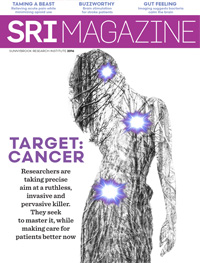Specialist care critical in treating vulvar cancer

New study finds women with a gynecologic oncologist more likely to get groin node dissection
June 13, 2016

Drs. Lilian Gien (left) and Lisa Barbera are part of a collaborative team of specialists who treat women diagnosed with vulvar cancer, a rare gynecological disease.
More gynecological research: Dr. Danielle Vicus is striving to extend survival in women with ovarian cancer
Gynecologic and radiation oncologists at Sunnybrook’s Odette Cancer Centre have conducted the largest Ontario population-based study evaluating patterns of care for women diagnosed with a rare gynecological disease.
Vulvar cancer is the growth of abnormal cells in the vulva, the skin tissue that forms the external female genitalia. It accounts for 5% of gynecological cancers and usually occurs in postmenopausal women.
Research has shown most women with vulvar cancer should undergo lymph node dissection in the groin, a surgical procedure to remove one or more of the oval-shaped glands that are part of the lymphatic system.
“We know lymph node status and the management of it is critical for patient outcome and overall survival,” says Dr. Lilian Gien, a gynecologic oncologist-surgeon and clinician-scientist at Sunnybrook Research Institute (SRI). Preliminary work showed only 62% of patients in Ontario were getting a lymph node dissection upon presenting with invasive vulvar cancer, but it was impossible to determine from the limited information in the databases the reasons why groin node dissection (GND) was not done, she notes.
To understand this better, Gien and colleagues, in conjunction with the Institute for Clinical Evaluative Sciences, conducted a detailed clinical and pathologic review of 1,038 patients diagnosed with vulvar cancer over a 10-year period in Ontario.
“We found about 68% of patients got a node dissection and 32% did not,” she says. Reasons why patients did not receive a GND included older age, obesity, presence of advanced disease, care by a nongynecologic oncologist-surgeon and referral to a centre not specializing in gynecologic cancer surgery.
Of these, they concluded that the most significant factor determining whether patients were more likely to have a GND was the presence of a gynecologic oncologist at the time of vulvar resection. Results were published in the journal Gynecologic Oncology.
Although there is a 90% survival rate for patients whose cancer has not spread to the lymph nodes of the groin, survival drops to 50% for patients whose cancers have metastasized.
In cases like these, surgery is required to remove the vulvar skin lesion and to determine the status of the lymph nodes. “It’s important that gynecologic oncologists evaluate those patients along with radiation oncology at initial consultation,” says Gien.
Dr. Lisa Barbera, a radiation oncologist and senior scientist at SRI, is co-principal investigator of the study. “The surgery helps us decide which patients need radiation; not every patient gets the combination. It depends what is found in the lymph nodes,” she says. “The radiation treatment is a very important part of the whole management when there is cancer in the lymph nodes.”
Moreover, Barbera notes, collaboration is important in for treating vulvar cancer. “Sunnybrook has a very large gynecologic practice, and we have multidisciplinary teams for making decisions. I think the concern with provincial studies like this is that the care may not be the same everywhere,” she says.
Barbera and Gien say they hope their research will address any knowledge gaps.
“When we’re focused on gynecological cancers and the improvement in the quality of care, it’s important to take a look at what’s going on in our province right now, and where the potential deficiencies are and how to make that better,” says Gien.
This research was funded by the Canadian Cancer Society Research Institute, the Gynecologic Disease Site at Odette Cancer Centre and the Ontario Institute for Cancer Research.



